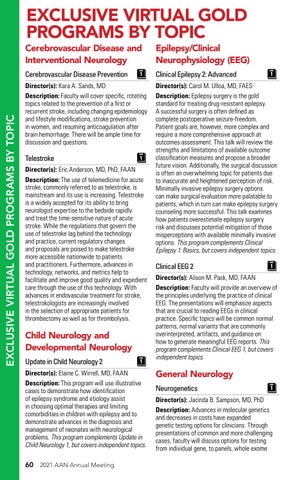EXCLUSIVE VIRTUAL GOLD PROGRAMS BY TOPIC
Cerebrovascular Disease and Interventional Neurology
EXCLUSIVE VIRTUAL GOLD PROGRAMS BY TOPIC
Cerebrovascular Disease Prevention
CME
1
Director(s): Kara A. Sands, MD Description: Faculty will cover specific, rotating topics related to the prevention of a first or recurrent stroke, including changing epidemiology and lifestyle modifications, stroke prevention in women, and resuming anticoagulation after brain hemorrhage. There will be ample time for discussion and questions.
Telestroke
CME
1
Director(s): Eric Anderson, MD, PhD, FAAN Description: The use of telemedicine for acute stroke, commonly referred to as telestroke, is mainstream and its use is increasing. Telestroke is a widely accepted for its ability to bring neurologist expertise to the bedside rapidly and treat the time-sensitive nature of acute stroke. While the regulations that govern the use of telestroke lag behind the technology and practice, current regulatory changes and proposals are poised to make telestroke more accessible nationwide to patients and practitioners. Furthermore, advances in technology, networks, and metrics help to facilitate and improve good quality and expedient care through the use of this technology. With advances in endovascular treatment for stroke, telestrokologists are increasingly involved in the selection of appropriate patients for thrombectomy as well as for thrombolysis.
Child Neurology and Developmental Neurology Update in Child Neurology 2
CME
1
Director(s): Elaine C. Wirrell, MD, FAAN Description: This program will use illustrative cases to demonstrate how identification of epilepsy syndrome and etiology assist in choosing optimal therapies and limiting comorbidities in children with epilepsy and to demonstrate advances in the diagnosis and management of neonates with neurological problems. This program complements Update in Child Neurology 1, but covers independent topics.
60 2021 AAN Annual Meeting
Epilepsy/Clinical Neurophysiology (EEG) Clinical Epilepsy 2: Advanced
CME
1
Director(s): Carol M. Ulloa, MD, FAES Description: Epilepsy surgery is the gold standard for treating drug-resistant epilepsy. A successful surgery is often defined as complete postoperative seizure-freedom. Patient goals are, however, more complex and require a more comprehensive approach at outcomes assessment. This talk will review the strengths and limitations of available outcome classification measures and propose a broader future vision. Additionally, the surgical discussion is often an overwhelming topic for patients due to inaccurate and heightened perception of risk. Minimally invasive epilepsy surgery options can make surgical evaluation more palatable to patients, which in turn can make epilepsy surgery counseling more successful. This talk examines how patients overestimate epilepsy surgery risk and discusses potential mitigation of those misperceptions with available minimally invasive options. This program complements Clinical Epilepsy 1: Basics, but covers independent topics.
Clinical EEG 2
CME
1
Director(s): Alison M. Pack, MD, FAAN Description: Faculty will provide an overview of the principles underlying the practice of clinical EEG. The presentations will emphasize aspects that are crucial to reading EEGs in clinical practice. Specific topics will be common normal patterns, normal variants that are commonly overinterpreted, artifacts, and guidance on how to generate meaningful EEG reports. This program complements Clinical EEG 1, but covers independent topics.
General Neurology Neurogenetics
CME
1
Director(s): Jacinda B. Sampson, MD, PhD Description: Advances in molecular genetics and decreases in costs have expanded genetic testing options for clinicians. Through presentations of common and more challenging cases, faculty will discuss options for testing from individual gene, to panels, whole exome



